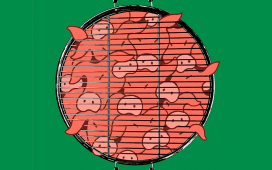The caucuses are almost upon us, and this weekend Amy Klobuchar, dividing her time between senatorial duties and Presidential goals, travelled to Iowa to address as much of the state as she could before returning to Washington for the impeachment hearings. Since the previous Sunday, when the Times co-endorsed Klobuchar and Elizabeth Warren, Twitter and Instagram had noted some #Klomentum. (#Feeltheklob and #Klozone got less traction.) Long lagging behind her competitors in Iowa, with polls giving her about five per cent of the vote, Klobuchar was now nearing double-digit support. She added events in towns whose names put a triumphant section of a song from “The Music Man” (“Dubuque, Des Moines, Davenport, Marshalltown, Mason City, Keokuk, Ames, Clear Lake—ought to give Iowa a try!”) in my head. On Saturday, Klobuchar visited Muscatine and Bettendorf. On Saturday night, the Des Moines Register announced its endorsement for Elizabeth Warren. On Sunday, undeterred, Klobuchar soldiered on to Waterloo.
It had been a snowy week, and the morning began with frosted windshields; I drove to Waterloo from Des Moines, two hours of unbending highway through gorgeous white farmland. There were grain elevators and windmills and quixotic billboards for Tom Steyer, looking just as startled to see us as we were to see him. In downtown Waterloo, across from a dog-walking area called Wiggly Field, Klobuchar’s event was held at Black’s Building Skyroom, in a historic eight-story building that had once been a department store. I happened to enter near Klobuchar and her entourage; she was smiling and saying something about turning into a pumpkin. Inside, on the eighth floor, a ballroom-like space was full of people of all ages, almost all of them white. Many wore clothes you might wear to church or the office; many others wore jeans, jean jackets, plaid. There was a lively energy, and a green “Amy for America” banner hung on the front wall. Klobuchar was introduced by Vikki Brown, the chair of the Black Hawk County Democrats, and the crowd cheered, mostly unprompted, at her mentions of Klobuchar’s accomplishments. “Thirty-four of the bills in which she was lead Democrat on were actually signed into law,” Brown said. “Klobuchar has built a reputation of putting partisanship and politics aside to strengthen the economy and help middle-class families.” Silence. “Let’s clap!” Brown said. (Getting dark money out of politics fared better.)
Klobuchar took the stage, to wild cheering. She wore a red blouse and a dark suit, her hair a controlled swoop. Her manner can give the impression of someone piloting a recumbent bike: energetic but not overeager. “I love grassroots campaigning,” she told the crowd—but the Senate beckons, too. “I’m a mom, and I can do two things at once,” she said. “It’s kind of like you turn into a pumpkin.” Klobuchar speaks deliberately, hitting clear points with humor. Many jokes are good; others have the spirit, if not the effect, of fun. About the impeachment hearings, she said that we need to hear witnesses—people who were, “in the words of the ‘Hamilton’ musical, ‘in the room where it happened.’ ” The stump speech was about forty minutes long, considerate of Iowa and its concerns, with material that included the Iowa native Joseph Welch, of “Sir, have you no sense of decency?” fame; John Deere; climate change and Midwestern flooding; and a promise to fire Secretary of Education Betsy DeVos on Day 1, to lusty cheers of approval. (DeVos has rattled many Iowans via public-versus-private-school-funding shenanigans, sometimes in closed-door meetings that have excluded Democrats and public-school administrators.)
Klobuchar was also amused and disgusted, by turns, with Trump’s misdeeds. She talked about a cattle rancher with whom she shared an A.T.V. ride—“I thought, This is not how I want to die,” she said, to laughs—who later told her that he voted for Trump but came to regret it the day after the inauguration, when Trump gave a self-serving speech in front of the C.I.A. Memorial Wall. In talking about C.I.A. officers who had died in the line of duty, Klobuchar’s voice got whispery and serious, and it stayed that way when she described what else the rancher didn’t like: Trump’s terrible behavior at the Boy Scout Jamboree. Klobuchar, like many American politicians, deftly weaves into such stories details about her family’s own just-like-you values and history—in this case, involving the Boy Scouts, her husband and his five brothers, who as children slept in triple bunk beds in their trailer home. The punch line was “and five of the six became Eagle Scouts—and I never want to say which one didn’t make it, because I don’t want to embarrass my husband.” The crowd roared at this, with something like the thrill of audacity.
Klobuchar’s calibrated control extended to the Q. & A., which at each event averaged three or four questions, pre-submitted via index card, answered with anecdotes as deliberate as the speech, pairing heartfelt emotion about existential political problems with pragmatic, feasible proposals. Jane from Cedar Falls wanted to know about guns, and Klobuchar paid respect to hunting—she always asks herself if gun-control proposals will “hurt my Uncle Dick in his deer stand”— but then cited background checks, magazine limitations, and the “boyfriend loophole” (a phrase made even more unnerving by its proximity to a mention of Mitch McConnell). There was discussion of a trust-fund-appreciation tax—the opposite of what she has called her more progressive competitors’ “pipe dreams.” She ended with an entreaty for campaign support. She likes to tell an anecdote about the late Minnesota senator Paul Wellstone, who had multiple sclerosis and, in the last year of his life, was unable to run around his distinctive green campaign bus during parades. He had so many green-shirted supporters running alongside the bus, she said, whispering again, that you couldn’t tell he wasn’t running himself. Now, she said, “that’s what I’m asking you to do for me”—spread her message as she returned to D.C. Then: a request to sign convention cards, a promise of selfies.
I approached a woman who had responded to the speech with enthusiasm, occasionally clapping with hands aloft. Her name was Barbara Borchert. “I love her moderation!” she told me, beaming. “And she’s a woman!” She raised her fist. “She does it all in a womanly way, a masterly way.” She paused. “Side note: I love them all.” Borchert, who lives in Minneapolis and recently retired from a forty-year career as a pediatric E.R. nurse, now volunteers for Klobuchar’s campaign. In 1984, she had joined a strike with her nursing union, which secured good salaries, benefits, and health care. “Nurses could afford to be nurses,” she said. (Her husband was a nurse, too.) Now those benefits were under threat from hospitals in league with big pharmaceutical companies, she said, and nursing education, which is difficult—“and it should be!”—is expensive, often prohibitively. Klobuchar understood this, and would help.
I talked to a dozen or so Iowans from the area, none of whom wanted to give me their names—or, especially, talk to a journalist. A gray-haired husband and wife, eying me suspiciously, liked Klobuchar’s centrism. “I’m impressed by how she spoke to the ordinary citizen,” the wife, who had worked for Black Hawk County, said. She held a copy of Klobuchar’s book, “The Senator Next Door: A Memoir from the Heartland.” What issues did they care most about? “One she didn’t mention,” the husband, a Navy veteran, said. “Military.” Also: fair labor laws. A tidy young man who would identify himself only as “a golf professional” told me that his chief concern was “the electability factor,” and that Klobuchar’s Midwesternness was an asset. Paul Simon’s “Late in the Evening” played, sounding appropriately mellow and warm, if, suddenly, a bit edgy. A kindly-looking bespectacled man who had retired from the University of Northern Iowa—teaching? No, “other things”—was impressed by Klobuchar’s three successful Senate campaigns and ability to win in red districts. “I’m a centrist,” he said. “I’d support any candidate to beat Trump.”
As I left Waterloo for Klobuchar’s next event, “Iowa Stubborn” came into my head again: “Oh, there’s nothing halfway / About the Iowa way to treat you / When we treat you / Which we may not do at all.” On to Ames! While driving, I listened to a political podcast in which Democrats were strategizing about which voters to try to activate and motivate, and how. Which candidate would inspire new or low-motivation voters? Which would avoid turning off the base? Who is the base? The landscape was still stunningly white and serene, with a thin layer of snow on the ground and a misty white haze in the air.








